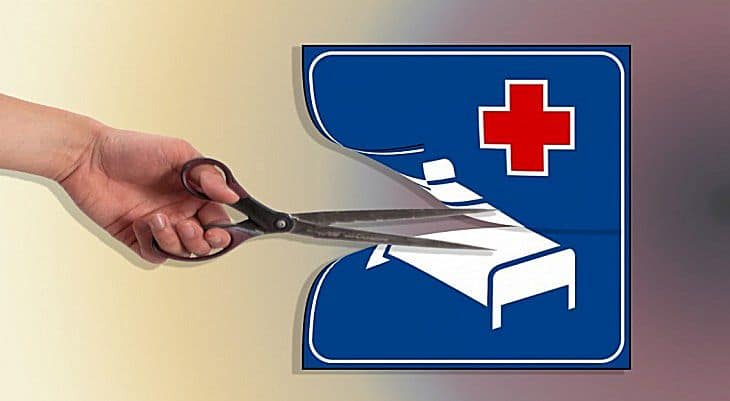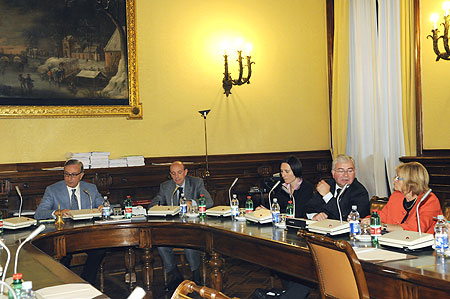
The report, extraordinary plan for construction and more attention to the fight against corruption
 In the coming years, the National Health Service (NHS) "will not be able to bear financial restrictions, on pain of further worsening of the response to citizens' health needs and a deterioration of the operators' working conditions". This is what the Senate Hygiene and Health Commission writes in the conclusions of the relation, unanimously approved, 'State and health perspectives of the NHS, with a view to the sustainability of the system and the guarantee of the principles of universality, solidarity and equity' presented to the Senate.
In the coming years, the National Health Service (NHS) "will not be able to bear financial restrictions, on pain of further worsening of the response to citizens' health needs and a deterioration of the operators' working conditions". This is what the Senate Hygiene and Health Commission writes in the conclusions of the relation, unanimously approved, 'State and health perspectives of the NHS, with a view to the sustainability of the system and the guarantee of the principles of universality, solidarity and equity' presented to the Senate.
In the last two years, the Commission has listened to the main players in the Italian health sector: from the Minister of Health Beatrice Lorenzin, to the heads of AIFA, Farmindustria, Federfarma, Assobiomedica, Fiaso, Agenas, ISS and the associations category of doctors, health professionals and the Regions. Between suggestions highlighted by the Commission: "An extraordinary plan of investments in construction and health technologies - underlines the report - carefully designed to build a driving force for employment and growth, as well as an opportunity to modernize the assets of the NHS". Furthermore, Italy "has not yet paid adequate attention to corruption in the health sector - observes the document - among the areas most at risk: the selection of personnel, the management of accreditations and the provision of services, the purchase of goods".
 The Commission believes that "a revision of the Lea according to the real health needs of patients can no longer be postponed" and that "a programming plan for human resources is needed with a revision of the existing constraints by introducing elements of flexibility". According to the analysis of Luigi D'Ambrosio Lettieri, one of the rapporteurs of the document together with his colleague Nerina Dirindin: "There is a profound suffering and a structural crisis of the NHS, the model of our health care is a flagship and its values envied abroad must be guaranteed, but a relaunch of the system is needed and not just of financing. There are 7 Regions - the senator points out - which are outside the Lea and this generates inefficiency and allows passive mobility. Furthermore, there is an increase in the number of Italians who give up treatment or who choose the private sector".
The Commission believes that "a revision of the Lea according to the real health needs of patients can no longer be postponed" and that "a programming plan for human resources is needed with a revision of the existing constraints by introducing elements of flexibility". According to the analysis of Luigi D'Ambrosio Lettieri, one of the rapporteurs of the document together with his colleague Nerina Dirindin: "There is a profound suffering and a structural crisis of the NHS, the model of our health care is a flagship and its values envied abroad must be guaranteed, but a relaunch of the system is needed and not just of financing. There are 7 Regions - the senator points out - which are outside the Lea and this generates inefficiency and allows passive mobility. Furthermore, there is an increase in the number of Italians who give up treatment or who choose the private sector".
'Revitalize' the system, is the watchword of Senator Dirindin in her speech: "The great difficulty of the NHS risks making a system lose energy and trust which is instead very virtuous and fair compared to others Villages. We must - he warns - take action above all to ensure better appropriateness and access to treatment. We owe a duty of gratitude to health workers who have made great sacrifices. Now – says the senator – we need to give them answers”.
In the ten final points of the summary of the report, the Health Commission also examined the sustainability of private spending: "Particular attention must be paid to spending on the various forms of supplementary protection, analyzing their costs and benefits". Two other topics investigated by the work of the Commission were the training and regulation of the responsibility of the doctor with the reduction of defensive medicine. For the first, the senators underline: "The need to open a phase of verification and revision of training courses, for access to the various professions and for the updating of health professionals look - they warn - at the contents, subjects and places of training, with the aim of making the best use of the available resources”.
While for the regulation of the medical responsibility of the doctor, "It is essential - emerges from the report - to review it to protect on the one hand the doctor in carrying out the clinical act (in itself risky) and on the other the patient's right to information complete and clear and to compensation for damages in a short time". Finally, the computerization and digitization of the NHS: "Technological solutions in the field of eprescription, e-booking, mobility, electronic health record (ESF) and 'cloud' can allow - the document points out - greater accessibility and better monitoring of patients as well as greater integration between operators who can evaluate treatment interventions more appropriately throughout the patient's care pathway".
Francesco Maggi – 8 July 2015 – PharmaKronos
Related news: Rome. The Jubilee brings 33.5 million euros to modernize the emergency departments of 12 hospitals.
Healthcare maneuver. Agreement signed on cuts of 2.352 billion for 2015 and 2016.
THE TEXT OF THE AGREEMENT on the cuts





